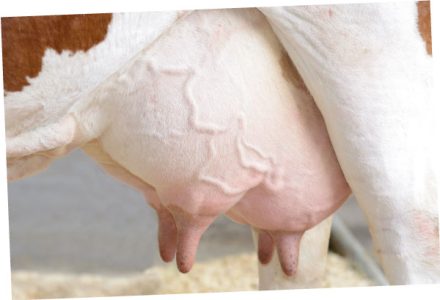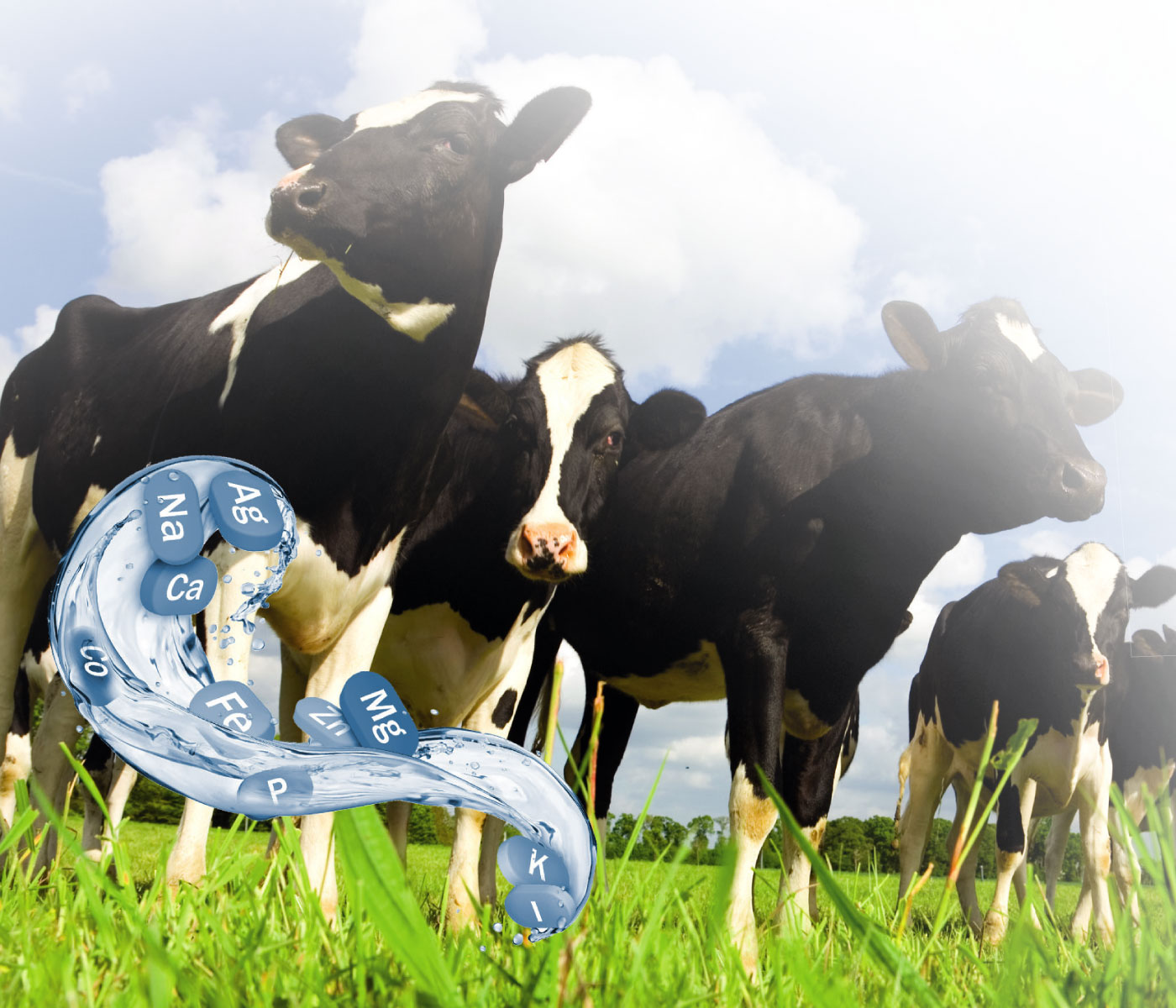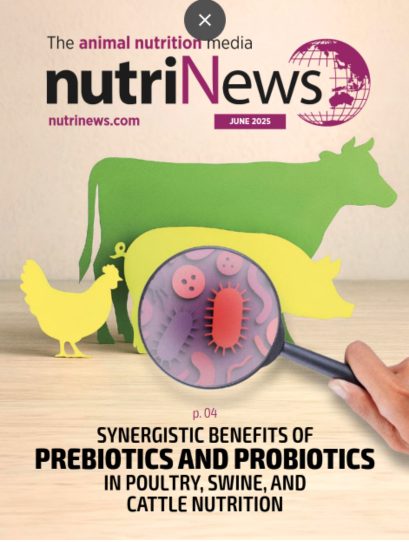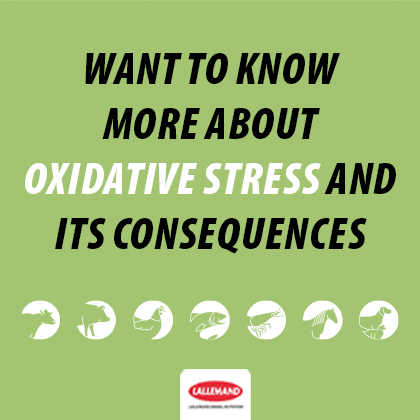Mineral nutrition and its association with mastitis in dairy herds.
Mastitis is considered to be one of the most costly diseases in dairy cattle, causing significant losses for the industry (Romero et al., 2018).
![]() These losses are not only related to factors of economic interest like: quality and quantity of milk produced, antibiotic use or the need for additional labour. As they also include the impacts that this disease has on: animal welfare, cows’ lifespan, and public health.
These losses are not only related to factors of economic interest like: quality and quantity of milk produced, antibiotic use or the need for additional labour. As they also include the impacts that this disease has on: animal welfare, cows’ lifespan, and public health.
![]() Bacteria such as staphylococci and streptococci are considered as the most common etiological agents behind udder inflammation.However, some viruses, fungi and algae can also cause mastitis (Ruegg et al., 2017).
Bacteria such as staphylococci and streptococci are considered as the most common etiological agents behind udder inflammation.However, some viruses, fungi and algae can also cause mastitis (Ruegg et al., 2017).
In addition to this, other non-infectious factors like:
![]() Genetics
Genetics
![]() Environmental conditions
Environmental conditions
![]() Diets
Diets
![]() Dietary supplements
Dietary supplements
can also have an impact on the occurrence of mastitis and its severity (Abebe et al., 2016).
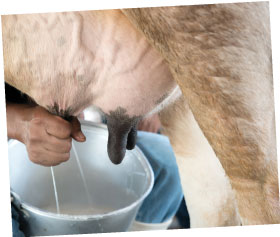
It has been established that nutritional deficiencies lead to a weakened immune response, which is a predisposing factor for microbial invasion of the udder.
Minerals have been reported as a group of nutrients that can influence udder health. Since they intervene in the formation of structural components of the organism, as well as allowing the proper functioning of enzymes, hormones, vitamins and cells.
Minerals can be divided into two groups according to the concentration in which they are found within the body:
![]() Macrominerals are present in plasma in relatively high concentrations (mg/dl). These are obtained through the ration, and their dietary concentration is usually quantified in grams. These include:
Macrominerals are present in plasma in relatively high concentrations (mg/dl). These are obtained through the ration, and their dietary concentration is usually quantified in grams. These include:
![]() Calcium (Ca)
Calcium (Ca)
![]() Phosphorus (P)
Phosphorus (P)
![]() Sodium (Na)
Sodium (Na)
![]() Chlorine (Cl)
Chlorine (Cl)
![]() Potassium (K)
Potassium (K)
![]() Sulfur (S)
Sulfur (S)
![]() Magnesium (Mg)
Magnesium (Mg)
![]() Trace elements or micro minerals on the other hand are found in relatively small amounts within plasma (mg/dl). Their inclusion in diets is usually quantified in ppm (parts per million). Some of the main elements in this group are:
Trace elements or micro minerals on the other hand are found in relatively small amounts within plasma (mg/dl). Their inclusion in diets is usually quantified in ppm (parts per million). Some of the main elements in this group are:
![]() Iron (Fe)
Iron (Fe)
![]() Copper (Cu)
Copper (Cu)
![]() Manganese (Mn)
Manganese (Mn)
![]() Zinc (Zn)
Zinc (Zn)
![]() Cobalt (Co)
Cobalt (Co)
![]() Chromium (Cr)
Chromium (Cr)
![]() Iodine (I)
Iodine (I)
![]() Molybdenum (Mb)
Molybdenum (Mb)
![]() Selenium (Se)
Selenium (Se)
Mineral requirements & deficiencies
Mineral deficiencies in ruminants are mainly associated with specific metabolic disorders such as:
![]() Peripartum hypocalcemia (milk fever)
Peripartum hypocalcemia (milk fever)
![]() Hypophosphatemia
Hypophosphatemia
![]() Hypomagnesemia (tetany)
Hypomagnesemia (tetany)
However,mineral deficiencies tend to not manifest themselves clinically. These are more likely to cause subclinical alterations such as immunosuppression. Presenting a predisposing factor for the appearance of infectious diseases, amongst which mastitis is a common culprit.
When managing animal nutrition in a dairy farm, special attention must be given to minerals. Considering that they are involved in various biological processes with great importance for cows. Therefore, these elements influence key features of milk production.
The dietary supply of a specific mineral represents the key factor that determines its concentration within the organism. Thus, the dietary requirements of certain minerals for dairy cows according to their physiological state must always be taken into account. Some of these are presented in Table 1.
Table 1. Daily dietary requirements of selected minerals in dairy cows,considering their physiological state (infant/non-lactating) according to the Nutritional Requirements of Dairy Cattle.
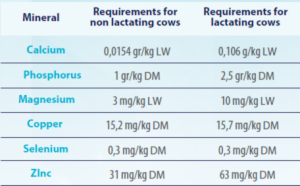
Source: National Research Council, 2001.
Assumed values for a Holstein dairy cow of 650 kg live weight (LW), with a production of 40 kg of milk per day.
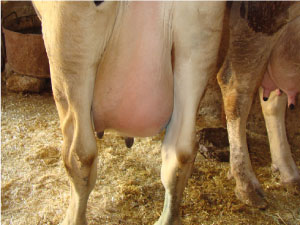
Mineral supplementation is a well established practice in dairy production. Mainly aimed towards the improvement of cows’ reproductive performance (Chester-Jones et al., 2013; Molefe and Mwanza, 2020). Nonetheless, its effects on cow health have also been investigates. Including the capacity to modulate the animal’s immune response which helps prevent the onset of mastitis.
This article aims to review some aspects of certain minerals of interest.Delving into the effects of their deficiencies, and how these contribute towards immune dysfunction and the onset of mastitis.
 CALCIUM
CALCIUM
Calcium (Ca) is involved in various functions of the body. It forms the structural components of the body and is essential for muscle contraction in both skeletal and smooth muscles.
![]() This includes an adequate contraction of the nipple sphincter after milking, which is crucial to prevent microbial invasion of the udder (DeGaris et al., 2018).
This includes an adequate contraction of the nipple sphincter after milking, which is crucial to prevent microbial invasion of the udder (DeGaris et al., 2018).
Kimura et al. (2006) reported that Ca concentrations in mononuclear cells found in the peripheral blood of Jersey cows decreased before calving. This phenomenon has a direct effect on the normal functioning of leukocytes (Zhang et al., 2019).
Ducusin et al. (2003) and Martínez et al. (2012) reported a reduction in the phagocytic activity of neutrophils derived from hypocalcemic Holstein cows, when compared to normocalcemic cows.
These authors pointed to subclinical hypocalcemia as a predisposing factor for infections.
In a study conducted on Holstein cows, blood calcium concentrations were significantly lower in cows with hyperacute coliform mastitis compared to healthy cows (Hisaeda et al., 2020).
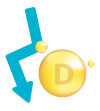
![]() These authors suggest that this phenomenon is associated with the production of inflammatory cytokines in cows with mastitis, which decreases the secretion of Parathormone and the conversion of 25-OH vitamin D to 1,25-D. Consequently, reducing calcium blood levels.
These authors suggest that this phenomenon is associated with the production of inflammatory cytokines in cows with mastitis, which decreases the secretion of Parathormone and the conversion of 25-OH vitamin D to 1,25-D. Consequently, reducing calcium blood levels.
 PHOSPHORUS
PHOSPHORUS
Phosphorus (P) is present in 85% of the skeletal system, as well as being an essential component of nucleic acids (DNA and RNA) and is a part of high-energy compounds such as ATP. This mineral also acts as a pH buffer(buffer system) in body fluids.
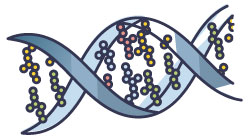
Phosphorus deficiency during the time of birth and early calving, has been associated with:
![]() Lower productivity
Lower productivity
![]() Reduced feed intake
Reduced feed intake
![]() Increased risk of morbidity in cows which have recently given birth.
Increased risk of morbidity in cows which have recently given birth.
Eisenberg et al. (2019) reported that hypophosphatemia negatively affects both phagocytic activity and granulocyte count in transitional Holstein dairy cows. They reported such findings while investigating immune function and resistance to infectious diseases in dairy cattle.
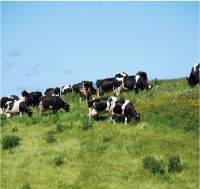
However, the mechanism associated with impaired immune cell activity in phosphorus-deficient cows has not been fully elucidated.
Reports on other animal species, such as rats, suggest that the ATP content of leukocytes tends to be lower in hypophosphatemic individuals, which can explain their decreased phagocytic activity (Kiersztejn et al., 1991).
 Concerns regarding environmental contamination associated with faecal P levels, has led to the recommendation of limiting manure P content. Resulting in a more restrictive use of this mineral in bovine nutrition.
Concerns regarding environmental contamination associated with faecal P levels, has led to the recommendation of limiting manure P content. Resulting in a more restrictive use of this mineral in bovine nutrition.
 MAGNESIUM
MAGNESIUM
Magnesium (Mg) plays an essential role in cellular metabolism and acts as a cofactor for more than 300 enzymes, including alkaline phosphatase and enzymes involved in the Krebs cycle.
The main site for the absorption of Mg++ is the rumen, which can be influenced by the type of diet and the presence of other minerals (Mattioli et al., 2006).
In regards to the immune system, Mg represents an integral part of the innate immune response.

Weglicki et al. (1992) observed elevated levels of proinflammatory cytokines (IL-6, TNF-α) in rats under Mg deprivation for three weeks. Van Orden et al. (2006) recorded an increase in total white blood cell counts in rats fed a diet with extremely low Mg compared to the control group (30 ppm).
Base on these results, magnesium can be considered as an important factor for a competent immune system. However, it’s still not clear whether Mg deficiency can act as a pro-inflammatory factor by itself or if it leads to immunosuppression, which then promotes inflammation.
![]() Therefore, more studies assessing Mg deficiencies in livestock are required to fully understand its role.
Therefore, more studies assessing Mg deficiencies in livestock are required to fully understand its role.
 SELENIUM
SELENIUM
It has been well documented that selenium supplementation can improve growth, reproductive performance and health status in cattle (Ullah et al., 2020).
Selenium deficiencies in cattle can cause:
![]() Delayed growth in calves
Delayed growth in calves
![]() Immunosuppression
Immunosuppression
![]() Reproductive disorders
Reproductive disorders
As far as the immune system is concerned, Se is contained in the active center of the enzyme glutathione peroxidase (GSH-Px), which confers it an antioxidant effect.
For such reason, selenium supplementation can result in positive clinical responses to various conditions with increased oxidative damage. As is the case of mastitis.
In vitro studies(Machado et al., 2014) based on bovine neutrophils also evidenced that Se supplementation helped to improve:
![]() chemotactic migration
chemotactic migration
![]() phagocytosis
phagocytosis
![]() superoxide dismutase (SOD) activity
superoxide dismutase (SOD) activity
![]() intracellular antibacterial activity against S. aureus (Hoggan y col., 1990)
intracellular antibacterial activity against S. aureus (Hoggan y col., 1990)
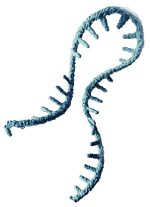 Recent studies (Jing et al., 2020) suggest that selenium may play a crucial role in immune and inflammatory regulation. Achieving this by influencing the differential expression of exosomal mRNAs in genes that are considered to be key for the prevention of bovine mastitis.
Recent studies (Jing et al., 2020) suggest that selenium may play a crucial role in immune and inflammatory regulation. Achieving this by influencing the differential expression of exosomal mRNAs in genes that are considered to be key for the prevention of bovine mastitis.
Sripad et al. (2016) and Hoque et al. (2016) reported increased treatment efficacy when an antibiotic treatment was combined with a selenium preparation. They reported either a lower incidence of clinical mastitis, or a shorter duration of clinical signs when Holstein cows were supplemented with this mineral.
![]() In turn, somatic cell counts have been negatively correlated with serum selenium levels (Wang et al., 2021).
In turn, somatic cell counts have been negatively correlated with serum selenium levels (Wang et al., 2021).
Particular attention should be given to the chemical form of selenium. Taking into account that organic sources (Se yeast and Se-Met) are considered to be more efficient bioavailable sources in comparison to inorganic Se.
Currently, the potential use of nano-Se in dairy cattle has gained great attention due to its multiple health benefits when compared to inorganic and organic Se sources(Pieszka et al., 2019).
 COPPER
COPPER

Copper (Cu) is considered to be necessary for the structural and catalytic properties of cuproenzymes such as cytochrome-C oxidase, superoxide dismutase, etc.
In addition, it has also been attributed antibacterial properties against bacteria that have been isolated from cows with mastitis.
![]() According to Reyes-Jara et al. (2016), a concentration as low as 250 ppm of (Cu) can inhibit the growth of common mastitis causing microorganisms like: Escherichia coli and coagulase-negative Staphylococcus.
According to Reyes-Jara et al. (2016), a concentration as low as 250 ppm of (Cu) can inhibit the growth of common mastitis causing microorganisms like: Escherichia coli and coagulase-negative Staphylococcus.
In vivo studies reported that dietary Cu supplementation during 100 days (Cu concentration in the experimental group of 20 ppm vs. 6.5 ppm in the control) resulted in a reduced clinical response of Holstein cows that were experimentally infected with E. coli through intramammary delivery(Scaletti et al., 2003).
 Copper deficiencies result in impaired phagocytosis and decreased Cu, Zn-SOD activity (Babu and Failla, 1993).
Copper deficiencies result in impaired phagocytosis and decreased Cu, Zn-SOD activity (Babu and Failla, 1993).
 ZINC
ZINC
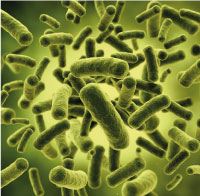 Zinc (Zn) is a trace element that plays a crucial role in maintaining rumen microbiota and protein synthesis. It is also a cofactor for a number of oxidoreductases and participates in keratin formation.
Zinc (Zn) is a trace element that plays a crucial role in maintaining rumen microbiota and protein synthesis. It is also a cofactor for a number of oxidoreductases and participates in keratin formation.
Specific studies reported that dietary supplementation of Zinc contributed to reduce somatic cell counts(Chandra et al., 2015) and amyloid A levels in milk (Cope et al., 2009).
An intact mammary epithelium, that is impenetrable to microorganisms, is considered to be an innate part of the udder’s immune system.
Weng et al. (2018) reported an improvement in mammary epithelial integrity when Holstein cows were supplemented with Zn preparations.
Zinc is crucial for the adequate development and function of the cells that mediate innate immunity. As is the case for neutrophils.
CONCLUSIONS
![]() When managing animal nutrition in a dairy farm, special attention must be given to minerals. Considering that they are involved in various biological processes with great importance for cows. Therefore, these elements influence key features of milk production.
When managing animal nutrition in a dairy farm, special attention must be given to minerals. Considering that they are involved in various biological processes with great importance for cows. Therefore, these elements influence key features of milk production.
![]() Minerals are also essential for the proper functioning of immune cells. Hence, any mineral deficiency can lead to immunosuppression and the negative health effects that are associated to this phenomenon.
Minerals are also essential for the proper functioning of immune cells. Hence, any mineral deficiency can lead to immunosuppression and the negative health effects that are associated to this phenomenon.
![]() Mastitis is a common problem even on well-managed farms. In this context, mineral supplementation represents a tool through which the innate immunity of the mammary gland can be enhanced. Contributing to reduce the risks associated with udder inflammation.
Mastitis is a common problem even on well-managed farms. In this context, mineral supplementation represents a tool through which the innate immunity of the mammary gland can be enhanced. Contributing to reduce the risks associated with udder inflammation.
